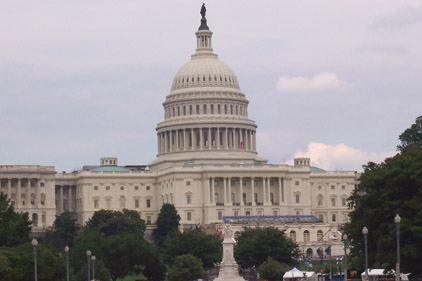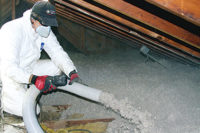In the House, a new performance-based rebate program for homeowners was introduced by Congressmen David McKinley, R-W.V., and Peter Welch, D-Vt. House Resolution 4230, titled the Home Owner Managing Energy Savings Act of 2012, or HOMES Act, offers federal rebates direct to homeowners who improve the energy performance of their homes.
The amount of the rebate is based on energy savings realized through the installation of high-efficiency heating and cooling equipment, improved ducting systems, insulation, and air sealing. The amount of the rebate starts at $2,000 for a 20 percent improvement in energy savings and can go as high as $8,000 for a 50 percent reduction.
Also in March, Sens. Jeff Merkley, D-Ore., and Richard Lugar, R-Ind., introduced Senate bill 2216, the Rural Energy Savings Program Act, or RESPA. This bill would enable the U.S. Department of Agriculture’s (USDA) Rural Utilities Service to make loans to rural electric cooperatives, which in turn will offer low-interest loans to their customers for energy-efficiency upgrades. Homeowners in these areas that choose to participate would repay the loans directly through their monthly energy bills.
The HOMES Act
Rep. Welch spoke on behalf of his bill at the recent AHRI Public Policy Symposium in Washington, D.C. According to Welch, “The HOMES Act, which was announced this year, and Home Star, two years ago, were based on the proposition that less is more. If folks have an opportunity to retrofit their homes or commercial landlords have an opportunity to retrofit their buildings and reduce energy consumption, that is a good deal.”
According to some in the HVAC industry, the HOMES Act represents an improvement over the Home Star bill that passed in the House in 2010 but ultimately stalled in the Senate. One difference that benefits HVAC contractors is that the HOMES Act directs rebates to the homeowner instead of requiring contractors to receive rebate funds from the government.
Another difference lies in how the HOMES Act requires that energy savings be certified by a third party. In the HOMES Act, the cited third parties include Residential Energy Services Network (RESNET) in addition to the Building Performance Institute (BPI). RESNET is a national, nonprofit organization that sets national standards for the assessment of a home’s energy performance and making cost-effective improvements to the home. Representatives of the Air-Conditioning, Heating & Refrigeration Institute (AHRI) and the Air Conditioning Contractors of America (ACCA) serve on RESNET training and technical committees.
In order to take advantage of the HOMES program and extend federal rebates to customers, an HVAC contractor has the option of gaining BPI accreditation, or becoming a RESNET Energy Smart Home Performance Team member. This team consists of a RESNET-certified home energy rater, an HVAC contractor that has completed the ACCA Quality Assured (QA) program and employs at least one North American Technician Excellence (NATE) technician, and an insulation installer or air sealer.
Charlie McCrudden, vice president of government relations, ACCA, said the contracting organization has been working with RESNET on the development of these teams. He noted that the HOMES Act “is a little bit more flexible in how the HVAC contractor can participate.” And, McCrudden added, “This is an improvement over Home Star because it is a pathway for the contractor to help the homeowner make more improvements.”
According to RESNET, an independent rater would go into the home to do a physical inspection of the heating and cooling system, test airtightness, and measure duct leakage. Then, the rater would develop a list of recommendations for the home, along with an estimated energy savings made possible by the improvements. The rater would also develop a work scope and pass the information on to the team to make the improvements.
Once the work is completed, the energy rater would return to execute post-testing, perform quality assurance that the work was done properly, and calculate energy savings.
“This legislation would create a marketplace for contractors to work together to provide whole-home solutions for homeowners,” said Steve Baden, executive director, RESNET. “Key to any improvement to a home is the HVAC system, and this [HOMES Act] creates the resources for homeowners to be able to finance these improvements.”
RESPA
According to information provided by RESNET, RESPA requires that certified third-party professionals conduct an initial energy audit and verify that energy up-
grades were installed per specifications. The USDA would develop guidelines that define the qualifications of those who can do this independent evaluation and verification.
“As a farmer, I know that the price of energy can take a heavy toll on the bottom line,” said Sen. Lugar, describing how the bill would affect his constituents.
“Hoosiers can save money by doing more with less energy through common-sense improvements at home.” He added that rural energy savings should be included in this year’s farm bill as an important aspect of rural development.
Legislative Outlook
Most recently, the HOMES Act was referred to the Committee on Energy and Commerce, and the Committee on Ways and Means. RESPA was read twice by Senate members and has since been referred to the Committee on Agriculture, Nutrition, and Forestry.
According to sources in Washington, D.C., both legislative items are unlikely to become law during the current session of Congress. However, these bills do signal that lawmakers are shifting their attention to energy legislation that is based on performance rather than prescriptive product upgrades.
To read the full text of the HOMES Act or RESPA, visit http://thomas.loc.gov and search for the respective bill numbers, H.R.4230 and S.2216.
Publication date: 05/07/2012






